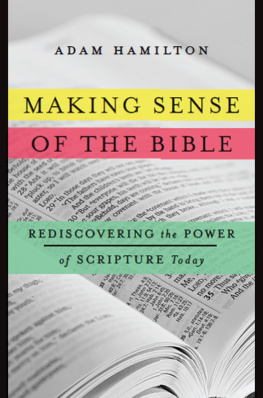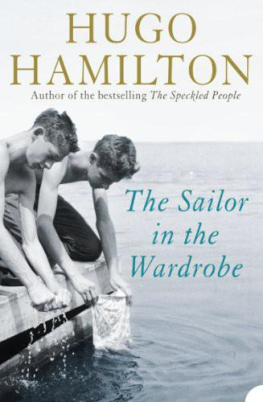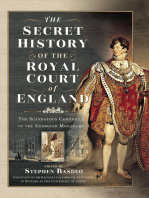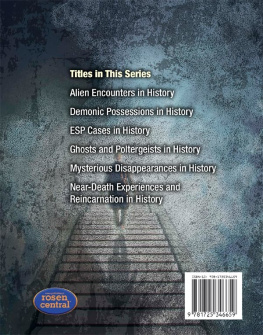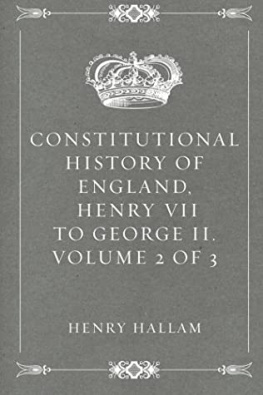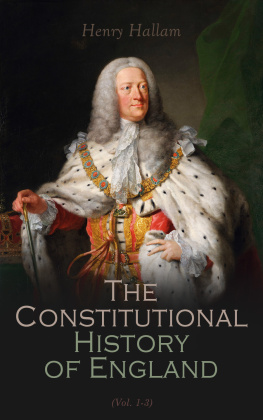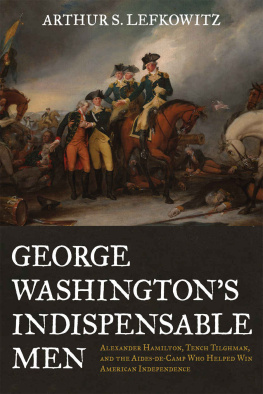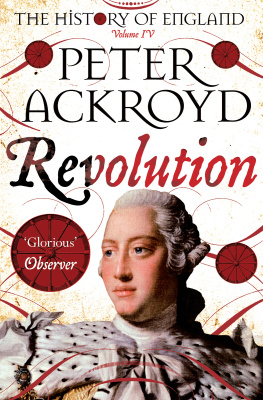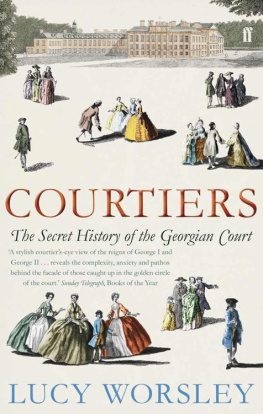
| Note: | Project Gutenberg also has Volume II of this work. See http://www.gutenberg.org/ebooks/37571 |
Transcriber's Note:
Due to an accusation of libel, some pages had to be rewritten and reprinted before the book was bound. Pages 1-24 were not printed and are missing from the original. See the for more information.
The original uses two kinds of blockquotes--one type has words in a smaller font, and the other uses extra white space before and after the quotation. The transcriber has used wider margins to represent the smaller font and higher line heights to represent the quotations with extra white space.
Variations in spelling and hyphenation have been left as in the original. A few typographical errors have been corrected. A complete list as well as other notes can be found the text.
A row of asterisks represents an ellipsis in a poetry quotation.
Click on the page number to see an image of the page.
[]
SECRET HISTORY
OF THE
Court of England,
FROM THE ACCESSION OF GEORGE THE THIRD TO THE
DEATH OF GEORGE THE FOURTH;
INCLUDING, AMONG OTHER IMPORTANT MATTERS,
FULL PARTICULARS OF THE MYSTERIOUS DEATH
OF THE
PRINCESS CHARLOTTE.
By the Right Honorable LADY ANNE HAMILTON,
Sister of His Grace the present Duke of Hamilton and Brandon; and of the
Countess of Dunmore.
" Of meaner vice and villains, sing no more,
But monsters crown'd, and Crime enrobed with Power!
At Vice's high imperial throne begin,
And boldly brand such prodigies of sin;
With pregnant phrase, and strong impartial verse,
The crimes of lords and crimes of kings rehearse! "
VOL I.
LONDON:
PUBLISHED BY WILLIAM HENRY STEVENSON,
13, WELLINGTON STREET, STRAND.
1832.
[]
[]
"TO THE READER."
The source from whence this Work proceeds will be a sufficient guarantee for the facts it contains. A high sense of duty and honor has prompted these details which have for many years been on the eve of publication. It will be worthy of the perusal of The Great because it will serve as a mirror, and they who do not see themselves, or their actions reflected, will not take offence at the unvarnished Pictureit may afford real benefit to the Statesman and Politician, by the ample testimony it gives, that when Justice is perverted, the most lamentable consequences ensue; and to that class of Society whose station is more humble, it may unfold the designing characters by whom they have so frequently been deceived. They only are competent to detail the scenes and intrigues of a Court, who have been most intimately acquainted with it, and it must at all times be acknowledged, that it is a climate not very conducive to the growth of Virtue, not very frequently the abode of Truthyet although its atmosphere is so tainted, its giddy crowd is thought enviably happy. The fallacy of such opinions is here set forth to public view, by one who has spent much of her time in the interior of a Court, and whose immediate knowledge of the then passing events, give [] ability to narrate them faithfully. Many, very many, facts are here omited, which hereafter shall appear, and there is little doubt, but that some general good may result from an unprejudiced and calm perusal of the subjects subjoined.
[]
"PREFACE."
How far the law of Libel (as it now stands) may affect is best to be ascertained by a reference to the declaration of Lord Abingdon, in 1779, and inserted, verbatim, at page ]introduced, to give a true and impartial view of the reasons which dictated such arbitrary and unjust measures enforced against that Great Man, and which will ever remain a blot upon the British Nation. These unhandsome derelictions from honorable conduct could alone be expressed by those who were well informed upon private subjects. Respect for the illustrious Dead has materially encouraged the inclination to give publicity to scenes, which were as revolting in themselves as they were cruel and most heart-rending to the Victims: throughout the whole, it is quite apparent that certain Persons were obnoxious to the Ruling Authorities, and the sequel will prove, that the extinction of such Persons was resolved upon, let the means and measures to obtain that object be what they might. During this period we find those who had long been opposed in Political sentiments, to all appearance perfectly reconciled, and adhering to that party from whom they might expect the greatest honors and advancement in the State. We need only refer as proofs for this, to the late "Spencer Percival," and "George Canning"who to obtain preferment joined the confederations formed against an unprotected Princess, and yet who previously had been the most strenuous defenders of the same Lady's cause.Well may it be observed that Vanity is too powerful,
"The Seals of Office glitter in their eyes,
They leave the truth, and by their falsehoods rise."
[] These remarks are not intended as any disparagement to the private characters or virtues of those statesmen whose talent was great and well cultivated, but to establish the position which it is the object of this work to show that Justice has not been fairly and impartially administered when the requirement was in opposition to the Royal wish or the administration.
Within these volumes will also be found urgent remonstrances against the indignities offered to the people of Ireland, whose forebearance has been great, and whose sorrows are without a parallel, and who merit the same regard as England and Scotland.Much is omited relative to the private conduct of persons who occupy high stations, but should it be needful, it shall be published, and all the correspondence connected therewith. It is true much honor will not be derived from such explanations, but they are forthcoming if requisite.
The generality of readers will not criticise severely upon the diction of these prefatory remarks; they will rather have their attention turned to the truths submitted to them, and the end in view,that end is for the advancement of the best interests of Societyto unite more closely each member in the bonds of friendship and amity, and to expose the hidden causes which for so long a period have been barriers to concord, unity, and happiness
"MAY GOD DEFEND THE RIGHT."
[]
[]
SECRET HISTORY,
&c. &c.
The secret history of the Court of England, during the last two reigns, will afford the reflecting mind abundant matter for regret and abhorrence. It has, however, been so much the fashion for historians to speak of kings and their ministers in all the fulsome terms of flattery, that the inquirer frequently finds it a matter of great difficulty to arrive at truth. But, fearless of consequences, we will speak of facts as they really occurred, and only hope our readers will accompany us in the recital with feelings, unwarped by party prejudice, and with a determination to judge the actions of kings, lords, and commons, not as beings of a superior order, but as men. Minds thus constituted will have little difficulty in tracing the origin of our present evils, or of perceiving
"How many that command should be COMMANDED !"
We commence with the year
1761,
about which period George the Third was pressed by his ministers to make choice of some royal lady, [] and demand her in marriage. They urged this under the pretext, that such a connexion was indispensably necessary to give stability to the monarchy, to assist the progressive improvements in morality and religion, and to benefit all artificers, by making a display at court of their ingenious productions. His majesty heard the proposal with an aching heart; and, to many of his ministers, he seemed as if labouring under bodily indisposition. Those persons, however, who were in the immediate confidence of the king, felt no surprise at the distressing change so apparent in the countenance of his majesty, the cause of which may be traced in the following particulars:


